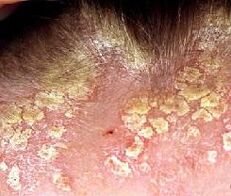
One of the most common forms of the disease is psoriasis of the scalp.
The disease itself is not an infectious process, but nevertheless the disease is inflammatory in nature.
The symptoms of psoriasis are very common in fungal diseases - red or pink patches appear on the head that are different in shape.
In addition to the development of a single or multiple rash, itching, burning and inflammation of the skin occur.
Causes of psoriasis
Why does psoriasis occur on the head and what is it? Doctors still do not know why some people develop scalp psoriasis. Doctors from time to time come up with new theories and refute the old ones. The causes of the disease are often linked to a genetic predisposition, and the factors that cause them are:
- Genetic burden - Parents with psoriasis have been shown to be one order of magnitude more likely to have a child with this diagnosis.
- One hypothesis is that violation of epidermal cell formation and maturation is a major cause of disease development.
- There is also an assumption that the cause is not in the epidermis but in the body’s immunity, which produces bad factors that negatively affect the skin.
- According to some scientists, disorder of the endocrine system also contributes to the development of the disease.
Today, the most likely cause of psoriasis is considered to be autoimmune processes in the sick person.
Is your hair horny?
Patients with the disease are often interested in the question - can hair loss be observed in psoriasis? It should be noted that mass baldness does not occur. If such a process occurs, it is in insignificant amounts because the hair follicles are deep and are not affected by the disease.
Is psoriasis contagious?
This fear is related to the unusual appearance and history of psoriasis. In ancient times, psoriasis was mistakenly considered a form of the terrible disease of leprosy. For the above reasons for the appearance of psoriasis, it is clear that this disease does not fall into the infectious category. Therefore, the answer to the question of whether you can be infected with psoriasis is a no-no.
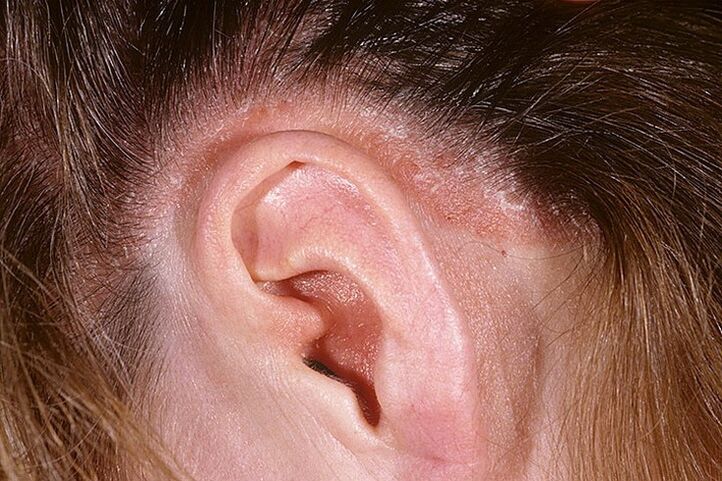
Symptoms
Psoriasis of the scalp is accompanied by characteristic rashes on the skin, which are represented by patches or more often plaques ranging from pale pink to brownish red. In most cases, the elements of the rash infiltrate from a minimal palpable rise above the level of healthy skin to a pronounced infiltration of more than 1 mm.
In the initial stage, only diffuse, inflammatory manifestations and no clear boundaries, abundant exfoliation in the form of dandruff is possible. It is very similar to other dermatoses of the head, making it very difficult to differentially diagnose and treat psoriasis of the head.
The most common symptoms of psoriasis are the "psoriatic crown" - the transition of the process from the scalp to the smooth skin of the adjacent areas of the forehead, the areas above and behind the ear, the posterior surface of the earlobe, the occipital region and the back of the neck.
Depending on the area and severity of the symptoms, there are 3 degrees of damage to the scalp:
- Easy- its main manifestation is the appearance of individual lesions on the head covered with small, thin scales;
- Hard- psoriasis completely affects the scalp, the scales are much larger in size and much thicker than in the mild severity of the disease.
Clinical studies show that in most patients, no factors can be identified that could explain the development of the disease. Most often, a combination of these causes is observed, which provides a basis for classifying psoriasis as a polyethiological disease.
The difference between psoriasis and seborrheic dermatitis
Differential diagnostic signs of psoriasis and seborrheic dermatitis:
- Psoriasis, in contrast to diabetes mellitus, has a more pronounced infiltration of rash elements due to acanthosis and hyperproliferation of the epidermis.
- Rashes in psoriasis often extend beyond the scalp, forehead (called a "psoriatic crown"), neck, and ears.
- Exfoliation is dry with psoriasis, and with diabetes the scales are fatter.
- More pronounced itching is seen in diabetes.
The patient should also be carefully examined and interviewed for damage to the nails and joints, the presence of which may be indicative of psoriasis and may significantly affect further therapy tactics.
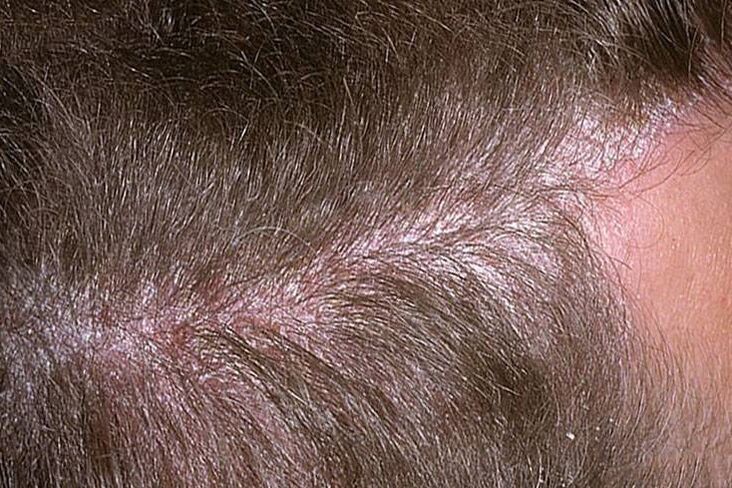
Treatment of scalp psoriasis
When scalp psoriasis is diagnosed, a number of measures are used to treat it, including:
- general therapy;
- local treatment;
- physiotherapy procedures;
- Spa treatment.
In mild cases of psoriasis of the scalp and in the absence of progression, in most cases it is sufficient to prescribe topical medications for treatment - shampoos, gels, ointments, tar, etc. However, the therapy of a continuously progressive inflammatory process may require the use of a wider arsenal of pharmacological drugs and physiotherapy techniques belonging to different groups.
How to treat psoriasis with medication?
In the general therapy complex, doctors may include the following medications:
- Vitamin complexes and group C, A and B vitamins;
- Non-specific immunotherapeutic drugs: ATP, Aloe;
- aromatic retinoids;
- cytostatics;
- Hemodez solution;
- Enterosorbents;
- Monoclonal antibodies;
- Immunomodulators;
- antihistamines;
- NVPS;
- Sedatives;
- Calcified autologous blood.
In case of severe psoriasis and significant severity of scalp symptoms, the inclusion of corticosteroid drugs and cytostatics is recommended. They should be used with extreme caution: such funds can exacerbate the course of the disease.
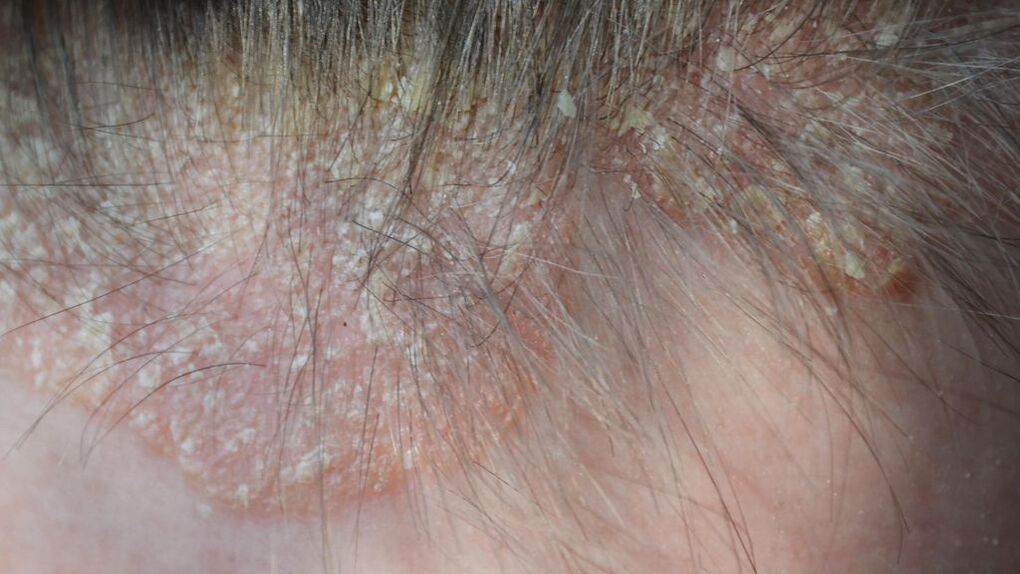
Shampoo for the treatment of psoriasis of the scalp
Is it possible to cure psoriasis on the scalp with shampoos? As a general rule, even using a very effective shampoo is not enough. However, the use of special therapeutic agents in complex therapy is a prerequisite for successful treatment.
All medicated shampoos help reduce the inflammatory process, relieve or reduce itching, but using only one shampoo is not effective - the treatment should be comprehensive.
Ointments
Topical treatment always helps to increase the effectiveness of the drug. Salicylic and boric salidol ointments will be useful in the progressive stage of psoriasis. In the case of an exudative component and severe inflammation, creams and ointments with corticosteroids should be prescribed.
Non-hormonal ointments contain birch, pine, juniper and coal tar. They can also be prepared as ointments and pastes.
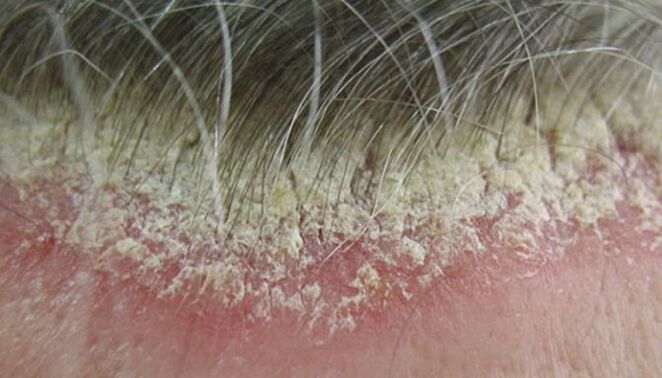
Diet for head psoriasis
The diet should be uniform. Food rations should be small, based on "better for less, but more often. "The last meal should be no later than 7pm, with a glass of kefir or yoghurt allowed at night.
- It is necessary to completely abandon alcoholic beverages. Their use may worsen during remission.
- Fatty, spicy and smoked foods should be excluded from the diet.
- Sweets are also not recommended - cakes, pastries, chocolate, sugar - all should be banned for psoriasis. Only small amounts of honey are allowed.
Among the drinks, sea buckthorn tea, rosehip or blackcurrant leaves will be useful.
Spa treatment
You must undergo the following procedures during your stay in hospital:
- sunlight treatment;
- mud therapy;
- hydrogen sulfide baths and bathing in hydrogen sulfide springs.
Treatment is performed in specialized sanatoriums, helping to reduce the frequency of relapses and achieve long-term remission.
PUVA therapy
PUVA therapy is a method of physiotherapy that involves the use of a photoactive drug and the irradiation of the skin with long-wave UV radiation.
Quite a long time of use and expert opinions confirm the effectiveness of PUVA therapy in the treatment of various dermatological diseases (including psoriasis), especially in the case of prolonged course and ineffectiveness of other therapeutic methods. According to statistics, a positive effect can be achieved in 80-85% of cases.
Hair care rules
To achieve better condition of your hair and scalp, you should follow the basic rules of care and your doctor's recommendations:
- Only wash your hair with the recommended special shampoo.
- Comb your hair with a natural bristle comb.
- Treat the scalp systematically with antiseptic mixtures.
- Comb your hair very gently, gently, without damaging your scalp.
- Try to dry your hair naturally without using a hair dryer.
- With psoriasis of the head, complex styling should be avoided, which requires the use of various hair styling products.























